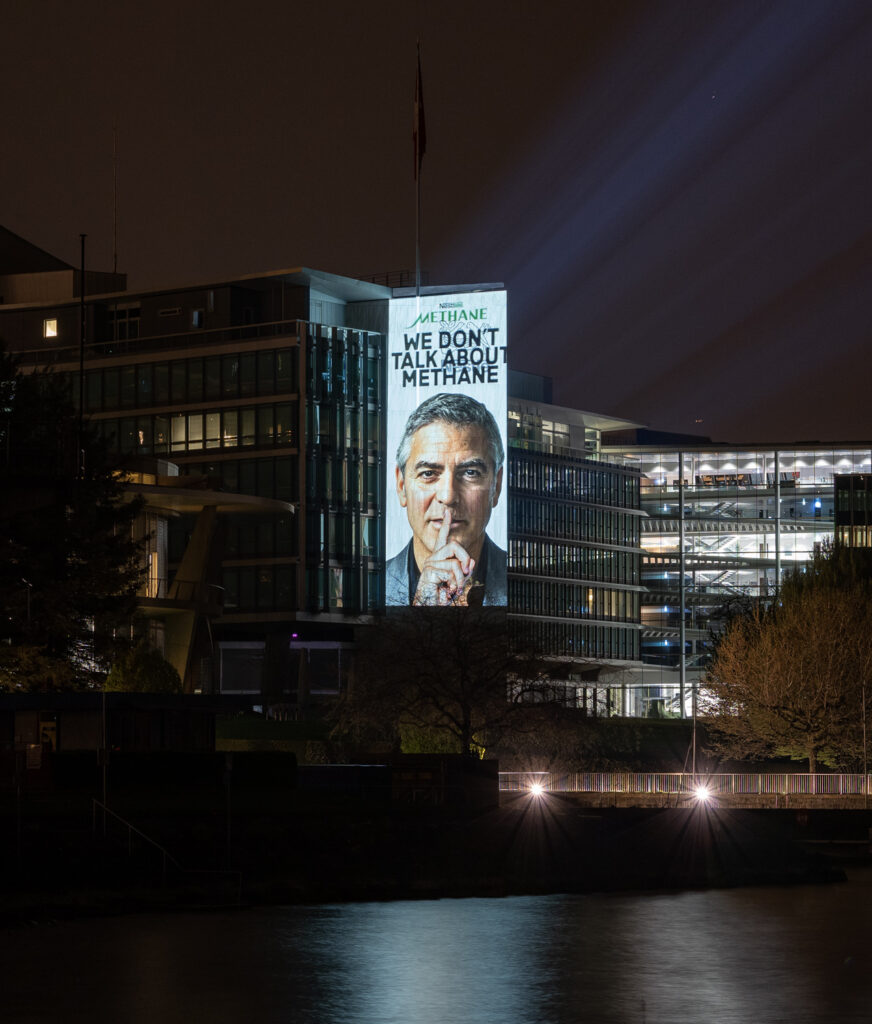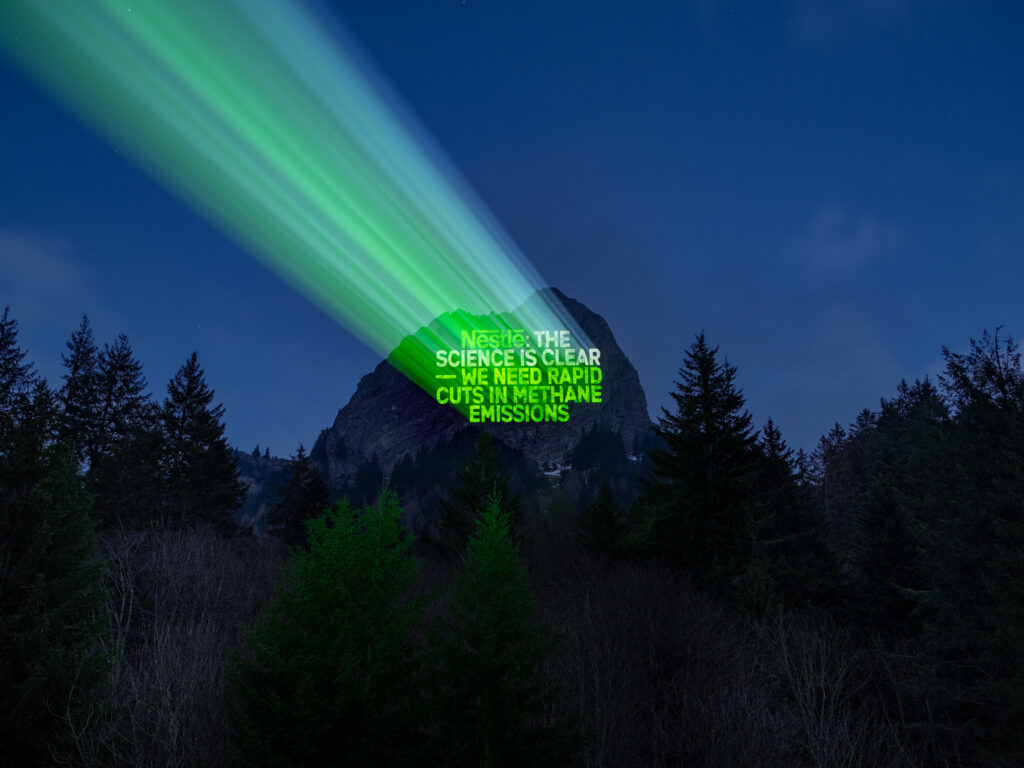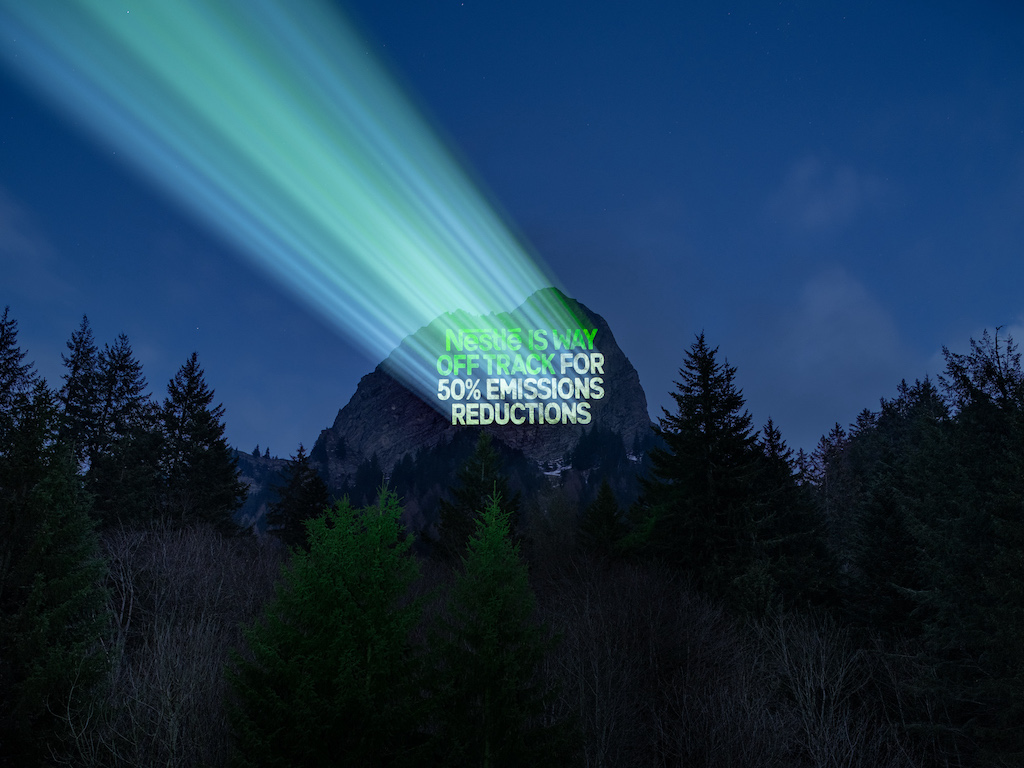5 Mins Read
In a new campaign, Changing Market Foundation asks dairy giant Nestlé to address the company’s methane emissions blindspot and get serious about its plant-based strategy.
On 20 April FMCGG giant Nestlé held its annual general meeting (AGM). The CEO, Mark Schneider, used the opportunity to announce to shareholders that he wants to focus on products that are “good for the planet”. For most of the people present at the meeting, this was welcome news, especially as the company’s ‘ambitious’ net zero roadmap is shiny with promises and pledges.
However, based on the internal analysis we have done as part of Changing Market Foundation’s mission to expose irresponsible corporate practices, we can share that the plan is little more than a green mirage, shimmering faintly on the horizon of the ever-warming planet. And hiding behind these empty promises are Nestlé’s outsized methane emissions.
This is why, on the eve of Nestlé’s AGM, we sent a message the company couldn’t ignore. Projected across three locations, we challenged Nestlé’s overinflated green claims, highlighted the company’s significant methane blindspot, and called for the company to ‘Cut methane and come clean now’. The evidence and context behind the projections are set out in our latest report, Net Zero Integrity: Nestlé’s Methane Blindspot.
During COP27, a UN High-Level Expert Group on Net Zero launched a report titled “Integrity Matters: Net Zero Commitments by Businesses, Financial Institutions, Cities and Regions”.
In many ways a gift to shareholders, or for anyone looking to scrutinise a company’s net zero targets, the report provides a set of criteria against which they can test if a company’s net zero commitments have integrity. Basically, a set of tools by which to identify if a net zero plan is robust, or pure fantasy.
At the time of the launch, the UN Secretary-General António Guterres was clear on the seriousness of the group’s intentions: “Abide by this standard and update your guidelines right away – and certainly not later than COP28”, he said, leaving no more excuses for the continuation of unfettered green fairytales.
Despite these clear guidelines, there seems to be little sign that companies are taking note, with many opting to stick with unsubstantiated commitments.
Meat and dairy industry emissions, in particular, continue to go largely unchecked, which is why we chose to review Nestle’s For this reason, we decided to peruse its climate plan with a fine-toothed greenwashing comb. After all, the company is one of the biggest food and dairy companies on the planet. If the company were to signal it was taking its responsibility seriously, it would no doubt need to more and bolder commitments from the company’s peers.

Nestlé’s net zero integrity
For over a year now we’ve been calling for the company to properly report and tackle its outsized methane emissions. Every time, the company’s spokespeople pointed us to its net zero roadmap. Our analysis pulls back the curtain on this roadmap, revealing the company fails to fully meet even a single recommendation from the UN’s guidelines.
Although the company positions itself as a sector leader in climate, its roadmap is full of creative accounting, has a huge methane blindspot, and is misaligned on genuine solutions like diversifying to more plant-based ingredients and producing “less and better” animal products.
Of the nine relevant recommendations in Integrity Matters, Nestlé fails to fully meet a single one. The company, by our analysis, partially meets five and completely fails on four. What’s more, Nestlé’s climate plans and reporting suggest that in five years, its emissions will only have reduced by a mere 1% rather than the 6.4% quoted in its ‘business as usual’ scenario.
The big fat methane blindspot
Amongst the Integrity Matters recommendations was a clear call for companies to separately report, and have separate targets for, substantial non-CO2 gases. When it comes to meat and dairy companies, their methane emissions are more than substantial – they are twice those of the entire livestock sector of Switzerland where Nestlé is headquartered.
Methane is a greenhouse gas that is 80 times more warming than carbon dioxide over 20 years, and the meat and dairy sector is the single largest source of these emissions worldwide.
Not only does Nestlé not report its methane emissions separately, but its mitigation plans also appear to almost completely ignore the science.
Globally scientists are in consensus: in order to meet the 1.5˚C global warming targets set out by the Paris Agreement not only does methane in general need to be drastically reduced but emissions from meat and dairy specifically have to be cut.
When it comes to reducing its emissions from dairy production, Nestlé is over-reliant on regenerative agriculture whilst ignoring real, proven solutions. Regenerative farming can have beneficial effects on biodiversity and soil health, and it’s certainly a step in the right direction. The reality is that these farming techniques remain unproven and unreliable when it comes to offering significant and permanent decreases in livestock-related greenhouse gas (GHG) emissions.

What about plant-based solutions?
Nestlé still has one golden ticket left. The company could successfully achieve the GHG footprint reductions laid out in its climate transition plan if it went full throttle on plant-based alternatives.
Instead, when it comes to plant-based products, Nestlé wants to have its (dairy-filled) cake and eat it too. The company has stated explicitly that plant-based products are not a substitute for its conventional meat and dairy ranges. Rather, it intends to grow both portfolios.
Nestlé acknowledges the emissions savings that plant-based options can provide – indeed in its roadmap it states that by 2030 it will reduce emissions by 1.4 million tonnes of CO2e by shifting toward more sustainable ingredients like plant-based foods.
However, in other reports, the company’s line on plant-based gets murky, with statements insinuating that if it reduced its dairy production and diversified, another (dairy) company would come in and replace them. This misalignment is evident throughout Nestlé’s climate position.
A head-in-the-sand approach to emissions reduction
Nestlé continues to ignore the climate science on methane and the urgency to drastically cut these emissions by 2030 to slow warming. This head-in-the-sand approach will impact the business in years to come, not least because dairy is highly vulnerable to both extreme and also slow-onset climate events, like droughts and heat waves.
We hope that the message we sent out during the company’s AGM was clearly heard by its shareholders and will lead to them questioning Nestlé on how “good to the planet” their portfolio really is. If the calls from shareholders about the ‘systemic risks’ of Nestlé’s reliance on unhealthy food is anything to go by, investors in the company are prepared to push for major change. Given the escalating climate emergency, we hope methane is next on their list.



